| |
|
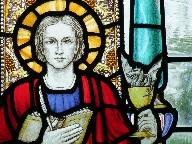 |
|
I've always had a soft spot
for this church. Back in the 1990s when I
first started exploring the churches of
East Anglia, this was just about the only
church which was kept open in an area of
locked ones. It is still open today, and
so now are many of the churches around
it, a mark of how attitudes have changed
towards pilgrims and strangers in the
last twenty years or so. Nowadays, when I
visit an area where the churches are
mostly kept locked, the Tendring
Peninsula or the Lowestoft area for
instance, I think of Flempton and know
that enlightenment might well reach these
areas too one day. It
was the Saturday of the beautiful Spring
Bank Holiday 2013. The weekend had been
preceded by a week of heavy rain, and
indeed there was more rain to come in the
following week, but for now Suffolk
looked green and lovely in the sunshine.
St Catherine's churchyard was a delight,
the high grass full of spring flowers,
the headstones peeping up through them.
It felt like God's Acre.
|
I
hadn't been back to Flempton for fifteen years,
and on the previous entry for St Catherine on the
site I had failed to explain quite how lovely
this church is inside. This is largely a result
of one of the best collections of early 20th
Century glass in this part of Suffolk. Some of it
is beautiful, some of it curious. Curosity
consists of the great west window, partly a
memorial to a parishioner killed in the Boer War,
but largely a tribute to Queen Victoria, after
her death in 1901. By Ward & Hughes, it
depicts the young queen kneeling before Christ
who is about to crown her, while Faith, Hope,
Charity and Compassion look on. She has taken off
her earthly crown, which now lies at her knees,
to receive the crown of Heaven.
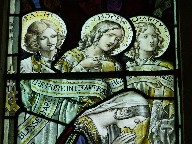 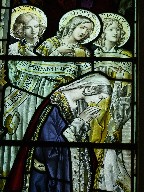 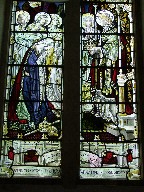 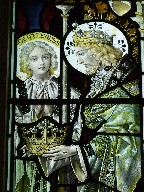 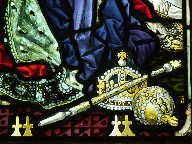
Facing each
other across the nave are two very good windows
of the early-to-mid century. On the south side, a
window by GER Smith depicts St John the
Evangelist flanked by St Francis and St
Christopher. Opposite is a fine depiction of St
Catherine and St Gertrude. It is unsigned, but I
wondered if it might be by FC Eden.
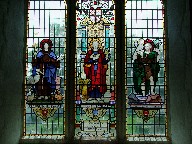 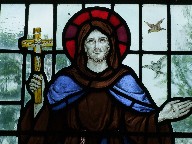 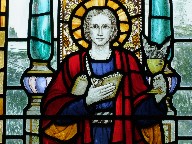 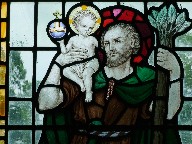
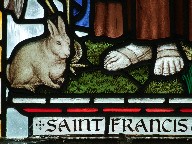 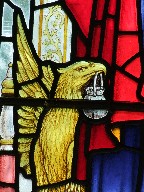
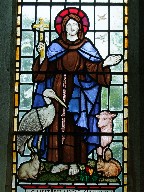 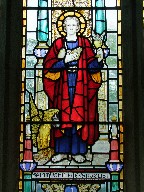 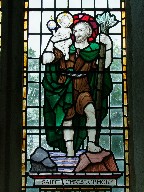 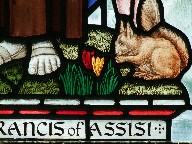
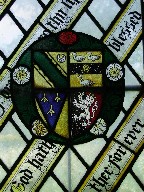 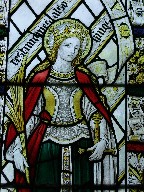 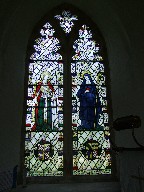 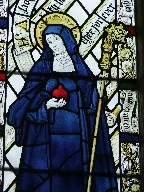 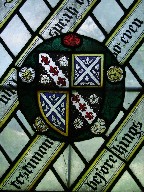
Up in the
chancel, the glass veers back towards curiosity
again. On the south side of the chancel there is
a low side window, and the glass in it depicts
Christ healing lepers. This arose from a mistaken
19th Century belief that low side windows were
actually squints for those suffering from leprosy
to watch the Mass through. You can see something
similar across the county at Barsham. The east
window is a powerfully drawn Crucifixion by
Clayton & Bell. It remembers John Lysaght,
and he and his wife appear to be depicted bottom
right and left, kneeling. The figure of Mary
Magdalene, shown grasping the cross in grief, is
particularly moving.
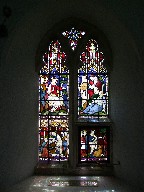
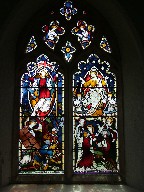 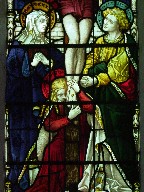 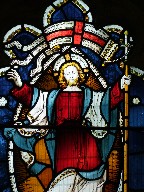 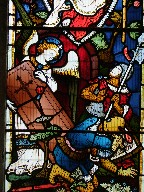 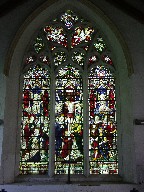
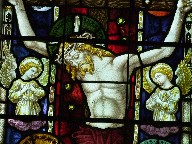 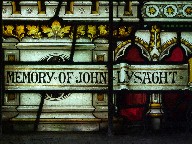 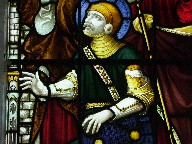 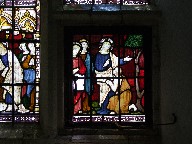
Amongst
all this excitement there are a number of quieter
medieval survivals. The Decorated double piscina
is lovely, and the plainness of the contemporary
font is seemly. The best 14th Century survival is
actually visible from outside - this is the
tracery on the door, still surviving despite the
almost complete rebuilding of the church a
century later, and another rebuilding after the
tower collapsed in the 18th Century. And that
century brought the royal arms, signed by the
painter Edward Boynter of Bury.
I
sat outside in the verdant churchyard, a good
place to eat a sandwich and drink a bottle of
water. The road along the south side of the
churchyard is the Bury to Mildenhall road, and
the Flempton to West Stow road with the village
pub runs along the west and north sides, but this
is a quiet place for all that, the grassy
graveyard seeming to swallow sound.
| The parish is a joint one
with the nearby village of Hengrave, the
round-towered church there becoming a
mausoleum and private chapel in the years
after the Reformation for the Catholic
family who lived in the Hall. The Hall
later became a school, and then after the
Second World War a convent. Hengrave
church sits barely a mile to the east of
Flempton, and is one of the most
interesting small churches in Suffolk. It
was easy to visit every day when the Hall
was in the care of the nuns, but the Hall
was sold some ten years ago, and the
church is now a zealously guarded private
venue for posh weddings. The Hall website
informs you that they can hold Roman Catholic,
Methodist, Baptist or United Reform
marriages. However, as it has not
been an Anglican parish church for almost
five centuries, they cannot, of course,
use it for Church of England ceremonies.
|
|
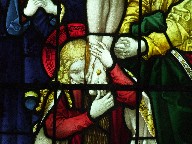 |
|
|
|

